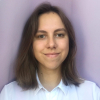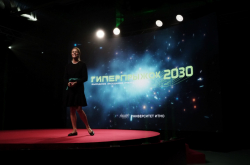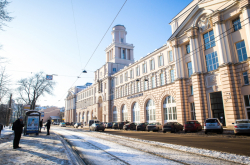We went virtual, St. Petersburg-style
To ease everyone's anxiety and remind them of the most important rules for getting through a pandemic safely, we enlisted the help of the internet's favorite creatures – cats – to create a picture guide for you and your loved ones.
Of course, it was important not only to keep your distance and wash your hands, but also to enjoy good views – even if you're staying at home. That's why we created [a series of self-isolation postcards] with views of St. Petersburg, ITMO University's beautiful hometown.
We didn’t give up on science
ITMO University is called “the first non-classical” for a reason. During the pandemic, the closing ceremony of the 9th Congress of Young Scientists was held at the university’s main building, but… in Minecraft. Traditionally, the Congress program includes a tour of ITMO University, and this year it was no different – the event’s participants visited virtual classrooms, the assembly hall, and cafeteria, while the most adventurous ventured into the rector's office.
We hosted a major conference on control theory in Zoom
The European Control Conference is one of the world’s largest conferences on control theory. Thanks to its online format, it managed to attract an even wider audience. The conference went on for three days and included presentations by researchers from 47 countries – Germany, Italy, France, Sweden, the US, Canada, Brazil, Japan, Australia, and many more.
We launched a series of scientific meetups
These meetups are informal meetings for researchers from ITMO and anyone interested Vladimir Nikiforov, Vice Rector for Research at ITMO University, moderates the events. The meetups are held once a month, each covering a certain problem or research that scientists from ITMO University are currently engaged in. Meetups are open to everyone – any scientist who wants to find out more about research activities of ITMO University is welcome to participate.
We held an international conference in metamaterials and nanophotonics
Instead of canceling major conferences, we discovered the advantages of the online format. For example, participation in METANANO SCHOOL 2020 became free of charge and attracted more participants. As a result, the school was attended by 230 participants from 105 universities and 40 countries.
We fought stage fright...
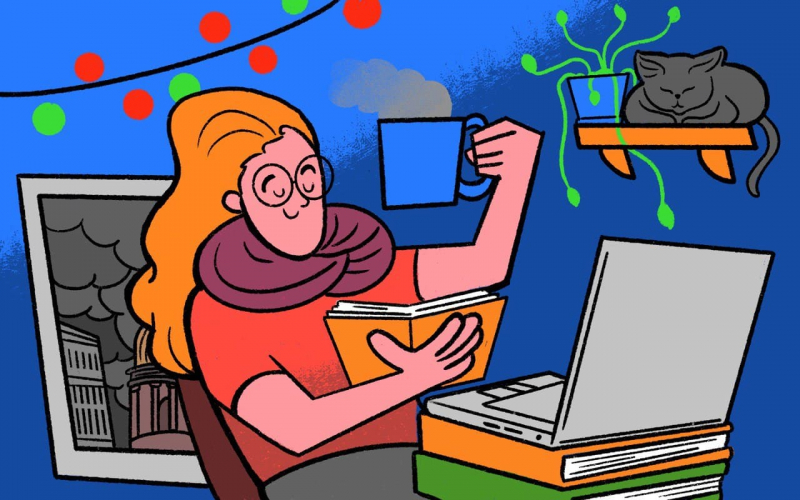
SPIE Photonics Europe is one of the world’s oldest scientific conferences. In 2020, it had to be held online. Antonina Dadadzhanova, a student at ITMO University’s Faculty of Photonics and Optical Information, shared that at first the conference was postponed indefinitely. However, later the organizers decided to hold the event online. Participation became free of charge, and those who were too nervous to present in public could do it in a more comfortable environment.
… and kept on studying
The learning process couldn’t help but evolve as well. For example, thanks to a project by the Faculty of Software Engineering and Computer Systems, students and staff of ITMO University are able to gain remote access to lab equipment and use it from anywhere at any time – all they need is a suitable device and internet connection. Moreover, the cloud platform allows you to create virtual labs. Some of the solutions that can be implemented in the framework of the platform were presented as part of the ITMO.Expert meetings.
We supported our lecturers
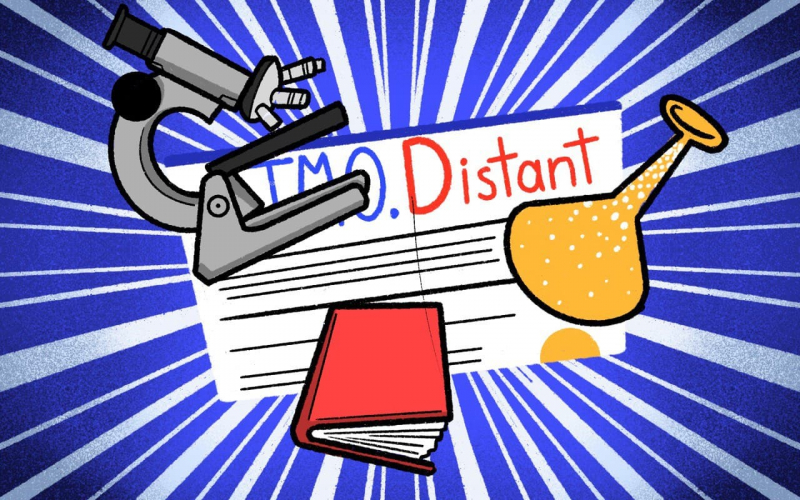
During the transition to online learning, lecturers, too, needed help adapting to new forms of teaching. In order to provide them with that, ITMO University launched the ITMO.Distant platform.
According to Ekaterina Dzhavlakh, head of ITMO’s Educational Technologies Office, ITMO.Distant is a platform that was put up online a couple of days after the transition to online learning in March 2020 in order to provide lecturers with information and advice on education in the new conditions. The platform itself is a website that provides methodological recommendations and useful tips on how to interact with students remotely.
By mid-December 2020, the website was visited 157,000 times. Most of these visits took place in November and the most popular materials are tutorials on using Zoom and Miro, holding an online exam, and usingvirtual labs.
Moreover, as part of the platform, there is an online consulting service by the Department of Academic Affairs. It allows staff members of the department to help interact with lecturers in live format. We discussed how it works in this article.
“ITMO University has all the tools needed for a broader use of AI, VR/AR technologies, and gamification. The university is moving towards creating an educational environment where reality meets augmented and virtual realities. On the one hand, it allows us to optimize the delivery of educational content to the student, blurring the line between educational and entertainment content. On the other hand, it requires different approaches to the selection of content and design of the learning process in accordance with the principles of openness, variability, adaptability, personification, and modularity. In particular, we see great potential in embedding online modules and micromodules in educational programs, as well as the prospects for collaboration with digital educational platforms for the rapid delivery of educational content,” explains Aliya Bagautdinova, the head of ITMO University’s Department of Academic Affairs.
Olga Eliseeva, head of the Department of Educational Quality Assurance, says it all consequently leads to changes in educational relations inside the university and appearance of new roles, as mentors and digital volunteers become partners of lecturers due to digital transformation.
We supported our students, too
The opening of ITMO University’s Faculty Support Office branches at the Kronverksky, Lomonosova, and Chaykovskogo campuses is another great way to help lecturers and researchers. Its goal is to create a comfortable environment for efficient work and professional growth of the faculty. Other than consulting the staff, the Faculty Support Office also holds workshops, professional development courses, internships, and more.
“Due to the transition to distance learning, fewer lecturers visit us because there are fewer of them at the university: some decided that it would be more comfortable for them to teach from home. Nevertheless, our office works offline according to the same schedule. We also continue to respond to inquiries and questions via email and phone – nothing has changed in this regard. We miss everyone and will be very happy to see everyone again at the university and our offices,” says Kristina Ivanova, the head of ITMO’s Faculty Support Office.
The office also helped lecturers set up the equipment for distance teaching in early December. According to Kristina Ivanova, the lecturers were provided with 10 laptops, several webcams, and headsets. Some lecturers picked them up themselves, and to some they were delivered home.
The office also held two courses in late November and December: one by their partners, the Teachers Light center, and the second by the methodologist Ekaterina Bezyzvestnykh. Both focused on assessing students’ performance and giving them feedback in the online format.
We kept doing sports
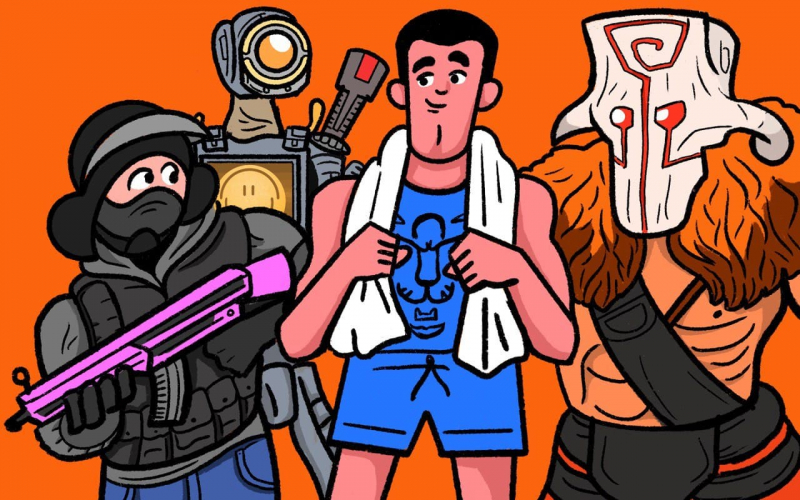
Esports with KRONBARS.ONLINE
According to Angelina Shulyakovskaya, PR manager of the Physical Training and Sports Department, the club’s most important achievement in 2020 was the creation of the full-fledged online training program KRONBARS.ONLINE.
In May, the KRONBARS.ONLINE program was shortlisted for the professional sports marketing competition MarSpo Awards 2020 in the nomination “best anti-crisis solution in sports marketing”.
“We designed the program in just a week. KRONBARS.ONLINE consists of nine formats of classes, from yoga to esports. We had more than 3,000 participants and viral content with thousands of views. For example, the #unovisionchallenge video got more than 27,000 views and more than 500 likes,” she says.
According to Evgenii Raskin, the head of the KronBars student sports club, most of this was done thanks to student feedback. A lot of interesting and modern formats were launched: a running club on Strava, which now has more than 1,500 thousand participants, online yoga classes that gathered around 300 people at a time, fitness marathons and challenges, and, of course, the most popular feature – esports competitions, the information coverage of which was more than 4,000,000 people.
Esports classes were an initiative of the student sports club KronBars. Students of the discipline were able to receive P.E. points by taking part in competitions and online training sessions. Students also participated in webinars, during which they studied the strategy and tactics of online games. Then, they could receive points in two ways: by joining a league, in which the number of points depends on the time spent playing, or by trying themselves in weekly tournaments – the higher the place, the more points you get.
“At the end of the last semester we realized that even if the situation were to stabilize completely, we would definitely continue to use new formats of our classes, which we did by offering all students different options – online and offline – at the beginning of the fall semester,” continues Evgenii Raskin.
The range of classes was also expanded by a significant number of Zoom classes taught by the club’s coaches. Those who wish to train offline can still visit sports classes in compliance with all the restrictions. Some athletes even managed to take part in competitions. For example, ITMO’s rowing team became the champion of Russia among students. The sports tourism club also became the best in Russia for the fourth year in a row.
ITMO University’s Creative and Corporate Projects Planning Center together with Tatyana Tarabanova, a teacher of modern dance, choreographer, and specialist in biomechanics, have created a series of video classes on how to approach physical exercise from anatomical and biomechanical points of view. The lectures (available in Russian) will be of use not only to dancers. They will also allow casual viewers to study the human body and to learn what happens when it moves, as well as find out how to approach physical exercise more thoughtfully and keep fit in self-isolation.
In our article we’ve listed free apps and resources that helped our students keep fit during the online learning.
We helped each other and those in need
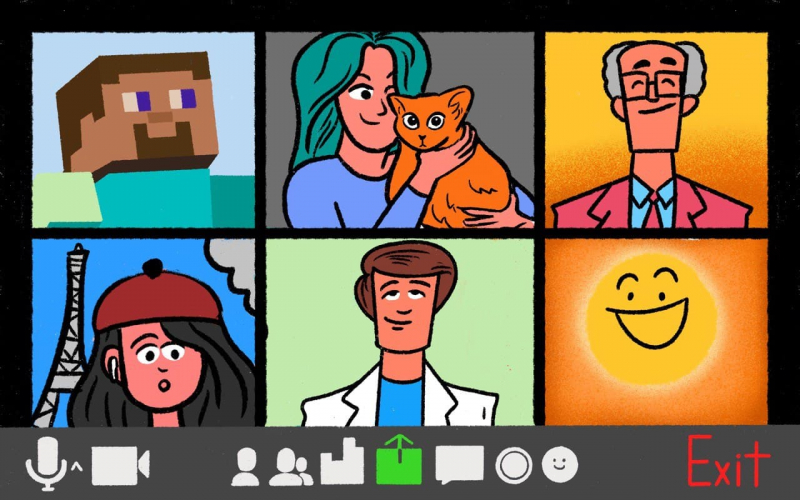
We are proud of our graduates. Some of them are engaged not only in science and business, but also in charity, which is especially important during the pandemic. In April, it became known that some hospitals lacked equipment and some school students lacked devices for distant learning. When ITMO alumnus Maksim Gavrilov found out about these problems, he donated respirators to the St. Petersburg Hospital №2 and laptops for school students through the city’s Committee for Education.
ITMO students and staff, too, helped those in need. Alexander Visheratin and Iuliia Fedorova came up with a way to relieve the psychological struggles of people in self-isolation – namely, they developed the HowWeSurvive app, which allows users to see what people around the world are doing right now.
Volunteers from ITMO’s Volunteer Center helped the university’s older staff members by delivering them groceries and configuring their devices for distance learning. Apart from helping the members of ITMO.Family, the volunteers continue to work at the city’s charitable foundations and shelters.
The student initiative was supported by Evgeny Mutovkin, ITMO graduate and entrepreneur. He equipped the volunteers with electric scooters rented by his company Electrosharing to make the delivery faster and more convenient. As Evgeny told us in an interview, the scooters proved their efficiency straight away: the volunteers were able to take up more orders and deliver the supplies faster.
ITMO students became volunteers as part of the #WeAreTogether initiative that sought to help the elderly and people with reduced mobility during the pandemic. The volunteers said that for them, it became not only an opportunity to help others, but also to meet new interesting people.
“It was very pleasant to witness everyone working as a team; ours is a tightly-knit group of people with a common goal – to do good deeds. After a day of volunteering, you feel incredible satisfaction from the work you’ve done. Each smile, each “thank you” is a sign that I made someone happier today. And this, in turn, makes me happy,” says Maria Stepanova, a student at the Faculty of Food Biotechnologies and Engineering.
Aside from medical schools, ITMO University was among the first universities to join the initiative and open its operational headquarters. Volunteers who helped the project to a greater extent received medals and certificates. Among them are two ITMO University employees: Andrey Zlenko, and Alyona Tarasova, the head and a manager of the Strategic Initiatives Support Department, respectively. There were also 15 ITMO University students: Anastasiia Brunova, Alexandra Derechi, Ekaterina Didenko, Elena Eliseeva, Alisa Ivanova, Mikhail Komarov, Ekaterina Kuznetsova, Natalia Pliukhina, Maxim Radaev, Maria Stepanova, Beksultan Seken, Evgeny Khokhlov, Yuri Frolov, Kristina Sharaeva, and Victoria Yakovleva. You can read more about volunteering here.
We helped online, too
The digital world includes digital volunteering. ITMO University students have completed a four-day training course at 20.35 University to obtain useful skills for online communication services and more.
Now, they help schoolteachers move the learning process online: to tune and set up software and to implement gamification. The participants commented that the skills they obtained can be of use not only to school teachers, but to lecturers and students, too.
We became more eco-friendly
This summer, the student club ITMO.Green and the volunteering movement SFERA held the international eco-friendly camp Ecohabits. The participants learned how to be more eco-friendly when travelling or arranging your interior, and obtained new useful habits. The program consisted of challenges, lectures in The Sims, online cooking, and other interactive activities that helped international participants communicate with each other and overcome the language barrier

